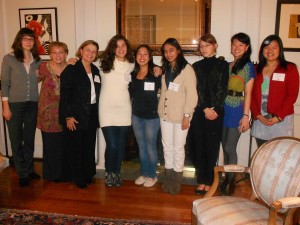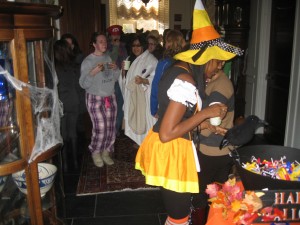 Last night, I was delighted to host at the President’s House a remarkable group of young women—Wellesley’s Davis-United World College Scholars. It was an informal event with no real agenda other than to welcome the new class of Scholars to Wellesley, and to enjoy one another’s company, something that often gets lost in our fast-paced world. It was fun to watch the older students reconnect and to watch the first years being drawn into the fold of what I think of as a sisterhood-within-a-sisterhood at Wellesley.
Last night, I was delighted to host at the President’s House a remarkable group of young women—Wellesley’s Davis-United World College Scholars. It was an informal event with no real agenda other than to welcome the new class of Scholars to Wellesley, and to enjoy one another’s company, something that often gets lost in our fast-paced world. It was fun to watch the older students reconnect and to watch the first years being drawn into the fold of what I think of as a sisterhood-within-a-sisterhood at Wellesley.
The Davis-UWC Scholars program provides need-based scholarship grants to students from around the globe, bringing some of the world’s brightest minds to select U.S. colleges and universities. As one of this program’s five founding institutions—along with Colby College, College of the Atlantic, Middlebury College, and Princeton University—Wellesley has educated more than 100 Scholars since 2001, in addition to the 42 students, hailing from 29 countries, who are on campus now.
 Our UWC students—past and present—are natural leaders before they even step foot on campus. And at Wellesley, they shine. They add an invaluable dimension to the classroom and to our campus community.
Our UWC students—past and present—are natural leaders before they even step foot on campus. And at Wellesley, they shine. They add an invaluable dimension to the classroom and to our campus community.
As Nelson Mandela said, “The striking thing about UWC is that they embrace the entire world across all divides of race, history, culture, wealth, religion, economic status and political belief: they are unique and they are conscious of their responsibilities.”
Last spring, many of us on campus were pleased to meet with and thank the supporters of the Davis-UWC program, Shelby and Gale Davis. When Shelby spoke, it was clear to all that this program was something he felt passionate about. Shelby and Gale’s inspiration and philanthropy have made an enormous difference in the lives of a large number of young people all over the world.
Wellesley is fortunate to have so many talented young women with such diverse experiences on our campus. I was honored to spend an evening with some of them.
 I spent a delightful Sunday evening with hundreds of Wellesley students. They came to the President’s House for Halloween, dressed in costumes of every imaginable type—I saw Cat in the Hat (along with Thing One and Thing Two), Princess Leia, characters from Harry Potter, a Starbucks logo, and even a group that came as a Scrabble game. The inventiveness of Wellesley students never ceases to amaze me.
I spent a delightful Sunday evening with hundreds of Wellesley students. They came to the President’s House for Halloween, dressed in costumes of every imaginable type—I saw Cat in the Hat (along with Thing One and Thing Two), Princess Leia, characters from Harry Potter, a Starbucks logo, and even a group that came as a Scrabble game. The inventiveness of Wellesley students never ceases to amaze me.
